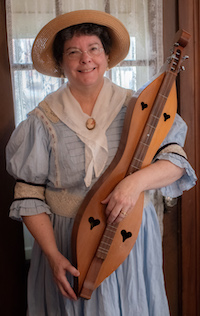Top to Toe: The Natural History of Clothing
Diane explores the hats, shoes, and everything in between that have been an intrinsic part of cultures around the world. The origins of spinning, weaving, and sewing are fascinating, and there are many songs and stories about them. Clothing has both responded to social issues and driven cultural movements through history.
During the program Diane will display items from her collection of antique technology, including raw fibers, spindles, bobbins, and shuttles. She will also show some of the many hats, dresses, and accessories she wears in her various historic programs.
For more information, please contact us.

Songs include:
- Singing the Travels, in which a nobleman tries to hire a farmer to be his servant, luring him with promises of fine clothing.- A Rosebud in June, celebrating the coming of spring, when the lads and lasses to sheep-shearing go.
- Serving Girl'ls Holiday, about the daunting amount of work a maid has to do before she can enjoy her day off. Sing along on the chorus: Spindle, bobbin and spool, away! What joy that it's a holiday!
- Young Ladies in Town, from the Revolutionary War era when women made homespun cloth to avoid buying British goods and paying those hated taxes.- The Hand Weaver and the Factory Maid, from the time when textile mills put itinerant weavers out of business. A weaver has fallen in love with a lass who weaves by steam, and plans to follow her into the factory.
- The Sewing Machine, a lively song from The Perils of Pauline, in which a young woman complains that long working hours leave her too tired to run around at night, saving her reputation, alas.
- Aragon Mill, a lament for the loss of a mill, a community, and a way of life. - The Song of the Sewing Machine, sung sadly by Fanny Brice in 1927, when immigrant piece-workers had no respite from their clattering machines.- The Bloomer's Complaint, a defiant song by a woman who plans to wear her scandalous new outfit despite social condemnation.
- Twelve to One, Diane's own song inspired by the fact that it takes twelve times as long to spin thread as to weave it into cloth.
"Your scholarship is amazing, your presentation was sparkly and entertaining, and your voice was strong and beautiful."
-- Elisabeth Taylor, Impresaria Productions
"Thank you so much for one of the best programs we have ever had. Your narration about the songs was priceless, and your lovely voice a treat."
-- Joyce Hawkins, Sheffield Historical Society
